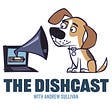Jake Tapper is the lead DC anchor and chief Washington correspondent for CNN, whose books include The Outpost, The Hellfire Club, and The Devil May Dance. Alex Thompson is a national political correspondent for Axios and a political analyst for CNN. They just published Original Sin: President Biden’s Decline, Its Cover-Up, and His Disastrous Choice to Run Again.
For two clips of our convo — on the deep dysfunction of the Biden family, and the blame Jill deserves for concealing Joe’s decline — head to our YouTube page.
Other topics: Alex leaving the Mormon Church after his dad’s ex-communication and a loss of faith; the cult-like loyalty of Biden’s aides; hiding Beau’s cancer; Hunter’s profound addiction; dating Beau’s widow and getting her on crack too; his emotional blackmailing of Joe; his influence peddling; his infamous laptop; Ashley Biden’s rehab and relapse; the Kennedys; the Bidens’ rift with the Obamas; Joe’s bitterness over Barack backing Hillary in 2016; the first signs of cognitive decline; the Covid election and razor-thin victory; his moderate campaign followed by a radical left agenda in office; Ron Klain’s woke influence; Mike Donilon’s greed and propaganda; “Jim Crow 2.0”; Joe preoccupied with foreign policy; inflation and Larry Summers; Jill addicted to the glamor of the White House; their disowning of a granddaughter born out of wedlock; Joe’s hubris and selfishness to run again; his delusions over polling; his disastrous debate; sticking with Kamala and sticking it to the Dems; the pillorying of Robert Hur; the media’s complicity in hiding Joe’s decline; the dissent of George Clooney, Ari Emanuel, and Dean Phillips; and the Bidens paving the way for Trump 2.0.
Browse the Dishcast archive for an episode you might enjoy (the first 102 are free in their entirety — subscribe to get everything else). Coming up: Chris Matthews — who just revived “Hardball” on Substack, Robert Merry on President McKinley, Tara Zahra on the revolt against globalization after WWI, Walter Isaacson on Ben Franklin, Arthur C. Brooks on the science of happiness, Paul Elie on crypto-religion in ‘80s pop culture, and Johann Hari coming back to kibbitz for his fourth appearance on the pod. Please send any guest recs, dissents, and other comments to dish@andrewsullivan.com.
I joined another pod this week — Josh Szeps’ “Uncomfortable Conversations” — to talk about the history of the marriage movement and today’s transqueer craziness. Here’s a free preview of the first third of the episode:
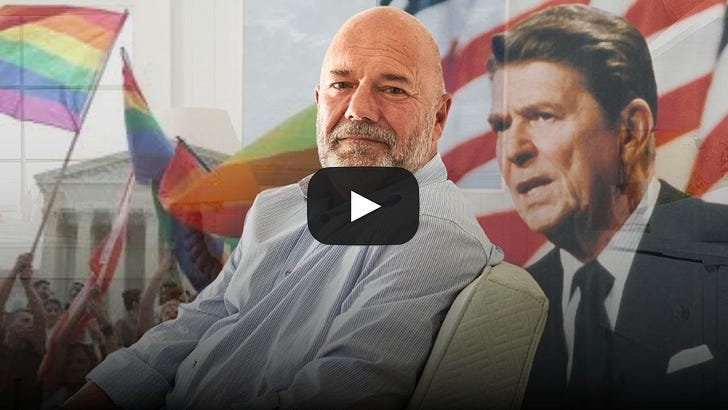
Subscribe to Josh’s substack for the whole thing.
Speaking of Strayans, our recent episode with Claire Lehmann just got this comment:
Thanks for the Claire Lehmann conversation. I love her way of speaking clearly and without haste, and her ideas were original and well thought out. Your prompting questions were perfect.
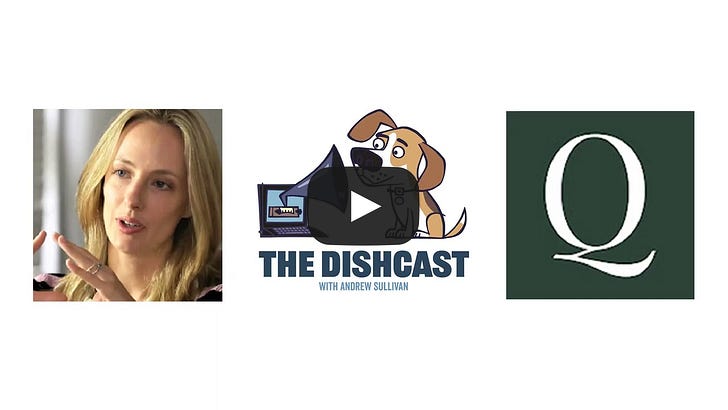
From a fan of last week’s pod on Bill Buckley:
I couldn’t wait for your discussion with Sam Tanenhaus, whose 1997 biography of Whitaker Chambers is outstanding. His appearance on the Dishcast was much better than I had even hoped for. Thanks! More historians, please.
Another writes, “It’s rare to listen to a conversation that is both intellectually stimulating and a true delight.” And another:
I just spent my Saturday afternoon picking weeds and listening to your conversation with Sam, and I feel compelled to write because this was definitely one of my favorite interviews yet (and I’ve been a paid subscriber for years). Obviously a fascinating topic, but both of your delight in it (and Sam’s laugh!) kept me hooked.
You should do more of these longer interviews with friends. I felt like I was listening to a privileged discussion on a subject I should know more about. (Perhaps I do now?) I still don’t quite know after listening where Buckley would stand on Trump and the modern GOP, but I guess I should just read Sam’s book.
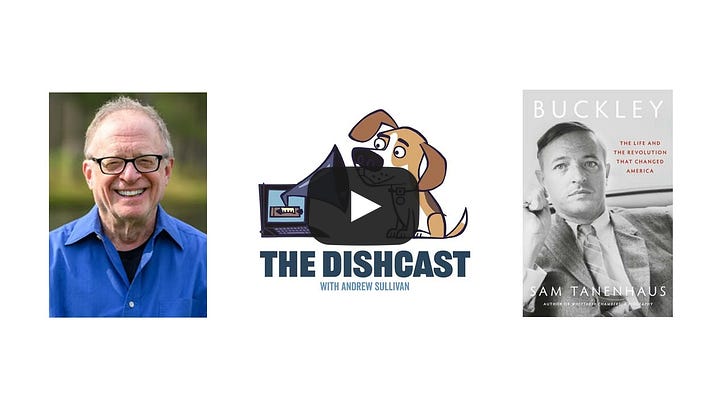
A dissent over the episode:
I’ve tried to quit emailing you, because my comments seem to end with snark, even though I enjoy your work. But your Buckley conversation itself was pretty snarky and petty. There was no grace extended to the man until the very, very end. Buckley had a big life, but the conversation seemed small. I can’t disagree with any points raised, but there was little balance.
I did, however, enjoy the grace note of Pat Buchanan’s letter to you at the end of the episode.
I didn’t feel that way about our chat. We both deeply admire WFB, especially as a decent human. And his influencer as a public intellectual? Remarkable. But not the kind of writer whose prose sings; and not the kind of independence that marked my true icons in the field: Orwell, Camus, Aron.
Another listener writes, “This is hardly a ‘dissent’ of any sort, but I hope you’ll read it”:
I mainly wanted to say what pleasure I found in hearing your conversation with Tanenhaus about old Buckley. Besides your advantages in both having known Buckley somewhat, it seemed to me that the two of you took real delight in trying to pin down his hypocrisies and puncture his (well-inflated) myth, but you were both glad to acknowledge what was good in the man, his personal generosities, etc. A provocative and engrossing discussion.
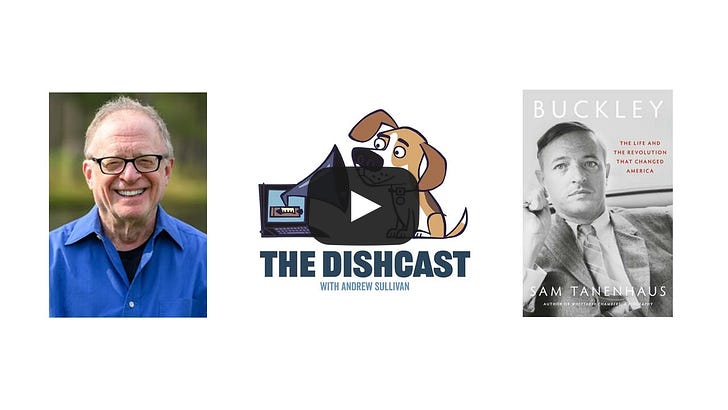
One suggestion: Tanenhaus, in passing, praised Matt Sitman (your old employee), Sam Adler-Bell, and John Ganz. I think any of those guys would make a great guest on the Dishcast. As a reader and listener of all three, I’ve found the mode of thought and conversation they follow to be really strongly reminiscent, somehow, of the qualities I’ve enjoyed in your own public work for decades now.
I do hope you will write your book about Christianity sooner than later. God bless you!
I’ve been meaning to ask Matt and Sam for a while, and your email promoted me to send a text. They’ll be on at some point, but not in the immediate future. And I’d never call Matt (or any Dish alum) an employee; he was a co-conspirator.
Here’s a long-time Buckley fan :
Your interview with Sam Tanenhaus was a special treat. Buckley was an early influence on me in the late 1950s and ‘60s. My Republican dad subscribed to National Review — I swear it came in a brown-paper wrapper to protect us from the Irish-Italian Democrats we lived among — and he watched Firing Line religiously every Sunday.
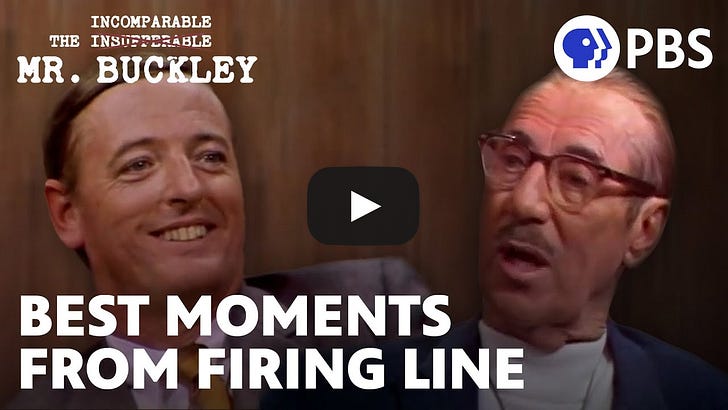
It was Buckley’s occasional name-droppings of Nock and Hayek and Mises in NR that introduced me to those libertarian giants, who led me to ditch Goldwater/Reagan conservatism and become a Ron Paul anarcho non-interventionist by 1976. During my journalism career, I had the pleasure of meeting Buckley in Pittsburgh in 1995 — he couldn’t have been nicer, and graciously helped me with my raincoat — and I did a long Q&A with him by phone a few months before he died in 2007. Both encounters are described here on my Substack.
By the way, please don’t dismiss Albert J. Nock so quickly as a snobby/cold aristocrat. Mencken didn’t hang with dummies, as you’ll find out quickly if you read Our Enemy, the State, or browse some of Nock’s essays in On Doing the Right Thing and Other Essays. He was not a man of the people, to say the least, and he took libertarian/conservative positions that were hard-hearted and politically incorrect even a 100 years ago — but he was a great editor, a great writer, and a great individualist.
When I interviewed Buckley in 2007, I asked him about Nock:
Q: Has conservatism made a bargain with the state or with government power that it should not have made over the last 50 years? Has conservatism forgotten the message of Albert J. Nock’s seminal book, Our Enemy, the State?
A: The answer is, “Yes, it has.” Accommodations have been made, the consequences of which we have yet to pay for. Albert J. Nock, although he could express himself fanatically on these subjects, would certainly have pronounced these as major, major mistakes. So, the answer to your question is, indeed those excesses have been engaged in and they affect the probity of the conservative faith. […]
Q: You’ve always had a visible libertarian streak —
A: Yes.
Q: — whether it goes back to your admiration of Nock or your opposition to the war on drugs. Yet you and libertarians have always been feuding. Is there a simple way to summarize the most important argument between you and libertarians?
A: I suppose the most important argument is the dogmatic character of libertarian conservatism. I once wrote an essay on the subject in which I said that if I were at sea on my boat and saw a light flashing, I would not worry deeply whether the financing of that light had been done by the private or public sector. This became a kind of playful debate with the (University of) Chicago (economists). By and large, it has to do with the tenacity with which some libertarians tend to hold on to their basic (principles)
Q: Is conservatism compatible with a welfare-warfare state that consumes so much of our national wealth and controls so much of our daily lives?
A: It’s incompatible with a state that overdoes it. If the demands on the state required a devotion and a preoccupation with it to the point of standing in the way of people devising their own preferences and their own order of preferences, then you could say it was a mortal enemy.
P.S. It was great to hear you and Sam both praise Pat Buchanan as a great guy. I interviewed him several times by phone in the 2000s, and every time I called him, he treated me like we were old pals who had been golfing the day before. I interviewed scores of famous and important and smart and powerful people during my journalism career (including you briefly in the early 1990s), and I’ve always told people that happy/pleasant Pat Buchanan was my favorite “victim”. (Ralph Nader, not so much.)
Buckley’s relationship with libertarianism is basically my own. He was speaking my language here in the entire interview. Here’s one more clip from the episode — on Gore Vidal gay-baiting Buckley:
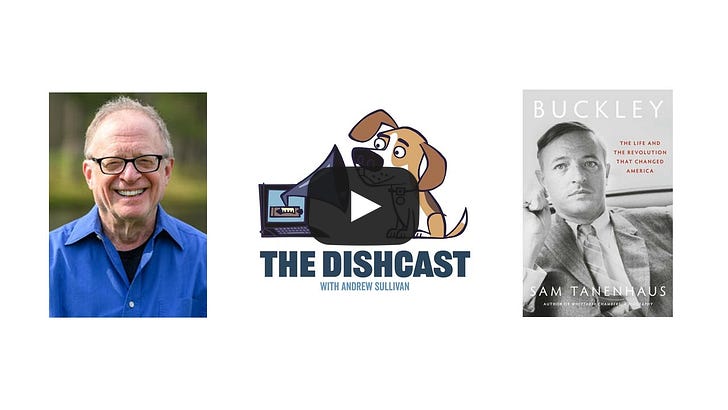
One more email on the Buckley pod:
I thoroughly enjoyed your interview with Sam Tanenhaus. I’ve been a Dishhead for a few years and rarely miss an episode. (I generally listen while taking our 85-pound Bernedoodle on his thrice-daily walks.) Over the past few months, after listening to Dishcast episodes, I’ve read Sebastian Junger’s In My Time of Dying and Ross Douthat’s Believe — both of which were catnip to a 66-year-old lapsed Catholic trying to revive his faith. Although I will likely not read Mr. Tanenhaus’s tome — 1,000 pages is too long for me — I did want to share a Zelig-like encounter I had with Buckley that you may find amusing:
The first occurred in the mid-’70s when I was a student at Regis High School, an all-boys Jesuit school on the Upper East Side that offers a tuition-free education to Catholic boys from the metro NYC area. Many students commute to Regis from the outer boroughs and are the first in their families to attend college. (I was no exception, having grown up in Queens as the son of a letter carrier and a stay-at-home mom.)
Buckley would occasionally invite a group of Regians to attend tapings of Firing Line, and one afternoon, I found myself a member of such a group. The studio was small, and the set relatively sparse. There were two chairs — one for Buckley and one for his guest — and we sat cross-legged on the floor. While I couldn’t tell you who the guest was or the topic of the interview, my first impressions of Buckley are forever etched in my mind. With his patrician manner, facial ticks, and indecipherably ornate language, he seemed otherworldly to me.
Thanks again for all your wonderful work on the Dishcast. I’m about two-thirds of the way through Jake Tapper and Alex Thompson’s Original Sin and look forward to his appearance on your show. While I’m enjoying the book, like many people, I am frustrated by Tapper’s “day late and dollar short” reporting. Please don’t go easy on him.
Well: you be the judge. I didn’t want to get into a media fight, and their book was not media reporting. But at the end, I did note my issues with the press corps and their herd-like cowardice and concern for what their peers think of them rather than for what readers deserve to know.
On last week’s column on Harvard and Trump, here’s a dissent from a reader who quotes me:
The independence of the university as a sanctuary for liberal learning is a foundational basis for a free society — as modern conservatives, Oakeshott above all, argued. No government should be able to intervene. That was the line between a free and an unfree society.
What a crock! The universities spent at least a decade descending into an ideological madness worthy of a Dostoevsky novel, and your proposed remedies are lawsuits and pleas to remember the importance of liberal norms and procedures...




